Maersk secures green methanol for maiden voyage
Maersk signs deal with OCI Global for delivery of green bio-methanol for 21,500 km trip from Ulsan to Copenhagen

Maersk has secured green methanol for the maiden voyage of the world’s first methanol-enabled container vessel. Maersk signed a deal with Dutch producer OCI Global on the delivery of green bio-methanol for the 21,500 km trip from Ulsan, South Korea to Copenhagen, Denmark.
The trip - more than halfway around the globe – will provide real operational experience for Maersk seafarers handling the new engines and using methanol as fuel as the company prepares to receive a fleet of new, large ocean-going methanol-enabled ships from 2024, says an official release.
“The green methanol market is still in its infancy and frankly we had not expected to be able to secure a maiden voyage on green methanol for this vessel," says Morten Bo Christiansen, Head of Energy Transition, Maersk. "So, we are very proud to have achieved this significant milestone. We expect a diverse green fuel mix for the future, with green bio-methanol from biomass waste being available now."
OCI produces its green methanol at a U.S.-based facility by using captured biogas from decomposing organic waste in landfills, the release added. "The biogas is upgraded to biomethane and injected into the gas grid and the methanol is produced from the biomethane in the grid on a mass-balance basis. This way, green methanol can be produced in existing facilities using existing infrastructure and plants enabling quick production. The method can contribute to a greener gas grid while capturing harmful methane emissions that would arise from the waste feedstock if left untouched. OCI’s green methanol is certified by International Sustainability & Carbon Certification (ISCC) in accordance with the EU Renewable Energy Directive."
Maersk aims to transport a minimum of 25 percent of ocean cargo using green fuels by 2030, compared to a 2020 baseline, to meet the ambitious 2040 target of net zero greenhouse gas emissions. The 2,100 TEU landmark methanol-enabled feeder vessel is an important step toward the long-term objective of gradually renewing the entire fleet to operate solely on green fuels, the release added.



